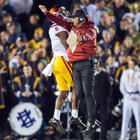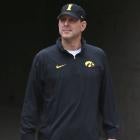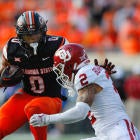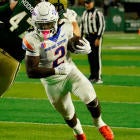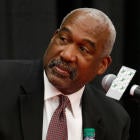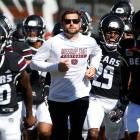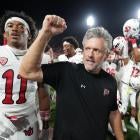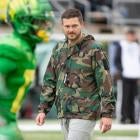Bob Stoops didn't need Oklahoma. That much was clear as he and good friend Rick Rundle streaked down a ribbon of Florida highway from Jacksonville to Gainesville almost 18 years ago.
The case could be made: Stoops had it too good with the Gators. For three seasons, he had worked for a national championship boss (Steve Spurrier) who didn't mess with him. Why leave? Florida was winning.
Stoops was hot -- hot enough as a rising young coordinator to finally say yes to Oklahoma. But not secure enough at age 38 to exactly need Oklahoma. Sure, the opportunity was flattering. But it was now or never for Stoops as he traveled back to Gainesville to gather up his things and begin recruiting for the Sooners in December 1998.
"Rick picks me up from the airport and I'm not in the car 10 minutes," Stoops recalled. "I look at him and say, 'Rick I think I ruined my life.'"
Wait, what?
"Because of how overwhelming it was," Stoop recalled, "I loved what I was doing. I was working with Coach Spurrier, and it couldn't have been any better.
"I was thinking, 'What did I go and do?'"
You know how that story ends. Stoops did indeed make it to Norman, Oklahoma, and has won nine Big 12 titles plus a national championship in 17 years there. He has become the next generational coach at a school that has pumped out a few of them. But the memories of looking over the cliff of his professional life never left him.
"I wouldn't say 'buyer's remorse,'" Stoops said. "That wasn't it. It was more the way I am. I didn't have to be a head coach."
Similar knots in stomachs, tinges of regret and consternation no doubt greeted this season's latest wave of first-time FBS head coaches.
They all have that moment when they sit in the big leather office chair, exhale and realize they are responsible for ... everything.
"Every day," Georgia's Kirby Smart said.
There were 29 coaching changes during the offseason. Nineteen of those men are beginning their first full season as FBS head coaches. That's the most in college football's highest division in at least 20 years.
There's no real trend, no strand of DNA that connects them all. The phenomenon just sort of happened this season. In those two decades, the total of first-time FBS head coaches has ranged from 18 (2009) to as few as eight (2006). Their situations, experience, stories spread across the country and spectrum.
| Coach | Age | New job (2016) | Previous job |
| Mike Jinks | 44 | Bowling Green | Texas Tech RB coach |
| Kalani Sitake | 40 | BYU | Oregon State defensive coordinator |
| Scottie Montgomery | 38 | East Carolina | Duke offensive coordinator |
| Kirby Smart | 40 | Georgia | Alabama defensive coordinator |
| Tyson Summers | 36 | Georgia Southern | Colorado State defensive coordinator |
| Nick Rolovich | 37 | Hawaii | Nevada offensive coordinator |
| Lovie Smith | 58 | Illinois | Buccaneers head coach |
| Matt Viator | 52 | Louisiana-Monroe | McNeese St. head coach |
| D.J. Durkin | 38 | Maryland | Michigan defensive coordinator |
| Mike Norvell | 34 | Memphis | Arizona State offensive coordinator |
| Tracy Claeys | 47 | Minnesota | Minnesota interim coach |
| Barry Odom | 39 | Missouri | Missouri defensive coordinator |
| Seth Littrell | 38 | North Texas | North Carolina TE coach |
| Chris Ash | 42 | Rutgers | Ohio State co-defensive coordinator |
| Jay Hopson | 47 | Southern Miss | Alcorn State head coach |
| Jason Candle | 36 | Toledo | Toledo offensive coordinator |
| Scott Frost | 40 | UCF | Oregon offensive coordinator |
| Clay Helton | 44 | USC | USC interim coach |
| Frank Wilson | 42 | UTSA | LSU RB coach |
Smart was a no-brainer at Georgia. Alabama born. Dawg for life. Prepped at the right hand of God, er, Saban. SEC in his blood.
Compare that to Bowling Green's Mike Jinks. Four years ago, he was coaching high school and has never so much been a college coordinator. No big deal. In less than a month, he'll call his first college play in the season opener at Ohio State against the coach whose shoes Jinks is trying to fill. That would be Urban Meyer, Bowling Green coach, 2002-03.
In consecutive seasons, Kalani Sitake went from defensive coordinator at both Utah (2014) and Oregon State (2015) to head coach at BYU. He is the first native Tongan head coach in FBS. "Identity should be based on what is in their heart," he told reporters, "not necessarily where they are born or what country they come from."
Scott Frost chose UCF more than it chose him. At age 40, he is now the most significant branch of the Chip Kelly coaching tree at Oregon. Frost, Oregon's former offensive coordinator, took the job despite UCF going 0-12. "The best thing you can do is address every single problem you have and try to kick it's ass," Frost said.
Clay Helton waited 21 years of his professional life -- six of them at USC -- for this moment. Helton had been the Trojans' interim coach twice before getting the full-time job last season after beating UCLA.
He certainly doesn't fit the USC mold. A native of Florida who played at Houston and Auburn before spending a decade as a Memphis assistant, he was hired by Lane Kiffin in 2010. By 2013, the native son of the South was the Trojans' offensive coordinator. Through the collapses of Kiffin and Steve Sarkisian, Helton became a sane, sensible alternative to the upheaval.
"USC is a Walt Disney World for coaches. You always dream about being there," Helton said.
A possible nightmare is right around the corner. Helton begins his first full season as a head coach Sept. 3 against Alabama in Jerry World.
"My least favorite word in the world right now is 'talent,'" Helton said. "I've heard 'talent' for six years. I really want to teach the kids technique, fundamentals, physicality."
If the Trojans don't respond quickly, the upheaval may continue. USC hasn't won the league since 2008. Helton became the Trojans' third permanent head coach in 71 months. That's the highest rate of turnover in Troy in more than a century.
Illinois' Lovie Smith has coached in a Super Bowl. In 11 NFL seasons as a head coach, he won 89 games with the Bears and Bucs. Yes, even he has a lot to learn on the job. It's been 22 years since the 58-year old Smith was last in college (1995, Ohio State defensive backs coach). "I'm not the only NFL coach who's coaching in college right now," Smith countered.
In fact, there are five former NFL head coaches in the game -- Nick Saban, Jim Harbaugh, Mike Riley, Ron Turner and Jim Mora Jr. None of them were hired by a 37-year old former Division III athletic director in ... March, six months before the season started.
"I didn't have any concern, none whatsoever," said Josh Whitman, that new AD who came over from Washington University in St. Louis. "He's proven himself to be one of the finest coaches in America. It was time for us to send a message."
Illinois was in disarray when Whitman, a former Illini tight end, took over. Tim Beckman had been dismissed the previous August for allegedly abusing players. Interim Bill Cubit finished the season, got a two-year contract and then was fired shortly after Whitman took over Feb. 17.
Smith quickly doubled down, hiring Hardy Nickerson as his defensive coordinator. Nickerson, a 16-year NFL veteran, breaks into major college football as a first-time coordinator -- in the Big Ten.
"The Big Ten very quickly has become a coaches' league," Whitman said. "We have a coach [Smith] who can hold his own in a very crowded space."
So crowded that the Big Ten leads the country with four FBS head coaches beginning their first full seasons at Illinois, Maryland, Rutgers and Minnesota. (Minnesota's Tracy Claeys coached six games last season and wasn't named head coach until Nov. 15).
They will share that crowded space with the likes of Harbaugh, Meyer, Mark Dantonio and Kirk Ferentz. Total college head coaching experience: 54 years.
Are any of the new guys really ready? Who knows? Of the 17 first-time head coaches from 2005, only four still are leading their teams -- Bronco Mendenhall, Mike Gundy, Kyle Whittingham and Les Miles.
That same season, Smart made a one-year stop as Mark Richt's running backs coach at Georgia. Eleven years later, he is replacing his former boss.
You probably know Smart best for spending 11 of the last 12 years by Saban's side. How's that for experience?
"Knowing you had someone out there learning from one of the greatest coaches ever to coach the game ...," gushed Georgia AD Greg McGarity. "I think he was ready. I would hope he might be waiting for this job."
The hire, then, is arguably the best of an overactive silly season. It makes complete sense. Kirby fits. Kirby gets it. Kirby is a Dawg with pedigree.
What could go wrong? Yeah, well, about that.
"He has asked from time to time," Smart said of Saban. 'What's going on? Why don't they [Georgia] win more?'
"I don't know that.I'll never know. They won good, they just didn't win big."
It's still hard to believe Smart is one the newbies. He has four national championship rings from Alabama. At the time he left, Smart was among the highest-paid assistants in the country.
Dawgs everywhere are expecting immediate success despite what can be argued was 15 years of it under Richt.
"That's probably what something I've taken from coach [Saban] more than anything," Smart said. "When he's critical of coordinators, coaches and players, it's never personal. Don't personalize it. Don't make it about you.
"Don't read what you [media] say. It doesn't matter."
Actually, it does.
Sitting at his desk as a first-time Power Five coach at Iowa State, Matt Campbell can tell you that. Campbell spent seven years at Toledo, the last four as head coach. As the latest bright, young (age 36) MAC coach ascending to the big time, he has some advice for Smart and the 18 other rookies.
"It's on you," Campbell said. "Every decision you're making is being looked at by 18-to-22 year olds. Where coaches get lost is they worry about everybody else out there. You better worry about what's within your walls."
The difference is Smart has behind him the full resources -- and expectations -- of an SEC program. Campbell is trying to revive the fortunes of the northernmost Big 12 outpost that has one winning season since 2005.
Smart is in the same conference -- and is virtually the same age -- as Missouri's 39-year-old coach Barry Odom. The former Mizzou linebacker suddenly found himself the face of the entire university last month.
Yes, you read that right -- the entire university.
When athletic director Mack Rhoades resigned on July 13 to go to Baylor, Odom had no athletic director, no president and no chancellor. One of those three positions remains staffed on an interim basis as San Diego State's Jim Sterk has since been introduced as the new AD.
Meanwhile, Odom had more knowledge about Mizzou than probably anyone in authority at the moment. He had spent 13 of the last 16 years of his coaching career in Columbia, Missouri, as a high school and college coach. That's not counting four years as a Tiger linebacker (1996-99).
Odom now has to coach and recruit through the effects of a student protest that eventually had the Tigers at its center. The football team threatened to boycott last November if Timothy Wolfe didn't step down as president. Wolfe eventually did step down.
Odom and the Tigers found out days later, while on the team bus to a game against BYU, that Gary Pinkel was retiring as head coach due to a cancer diagnosis.
As Rhoades quickly scoured the country for Pinkel's replacement, Odom stepped up to his second search committee interview with a bold assertion: They were looking at the Tigers' next head coach.
"It was important to let them know I knew more about the University of Missouri than anybody in the room," said the man who continues to be the face of the university.
The antithesis of Odom has to be Jinks. Bowling Green's 44-year coach has no connection to his new school, conference (MAC) or the AD who hired him. When Dino Babers left for Syracuse on Dec. 5, then-AD Chris Kingston began searching the internet for statistics and answers.
What schools had the most high-powered offenses and who was responsible for them? Kingston's eyes drifted to Jinks, who had become Texas Tech's associate head coach two years after being hired from Steele High School in Texas.
Red Raiders' coach Kliff Kingsbury quickly heaped loads of responsibility on Jinks -- fundraising, recruiting, speaking.
Kingston was intrigued. He wanted someone who would keep running Babers' zone-read spread offense. The current Falcons had been recruited to it. In two seasons, Babers won 18 games, a MAC title and took Bowling Green to a pair of bowl games.
Jinks' coaching career looked a lot like that of Art Briles, formerly of Baylor. Both came up running wide-open offenses at Texas high schools. Both got hired as first-time FBS head coaches coming from Texas Tech as running backs coaches.
Jinks is believed to be the only current FBS head coach without experience as a head coach or coordinator in Division I (FBS and FCS). Complicating the transition, Kingston left in April to take a job out of the profession with Learfield Sports.
"It hasn't really hit me yet," Jinks said.
For a starter job, it ain't bad. There is pedigree in Bowling Green, Ohio, too. In addition to Meyer, Bowling Green has also produced hall of fame coaches Don Nehlen and Doyt Perry.
The chances for long-term success at any of these jobs varies.
Seven of the 29 coaches who were replaced didn't even make it through the 2015 season. Three of those seven left on their own (Jerry Kill, Steve Spurrier and George O'Leary).
The 19 rookie coaches come to programs with a cumulative .478 winning percentage last season. However, seven of the 19 take over teams coming off a season of at least nine wins. Five of the 19 have either won a national championship as a player, played for one as a coach or been to a Super Bowl.
There's no link, no common DNA. Just hopes, dreams and -- at some point -- that doubt Stoops harbored so many years ago.
"In this business, you can be in such a big hurry to climb the ladder," Frost concluded in a private moment this summer, "that you step on the wrong rung."












